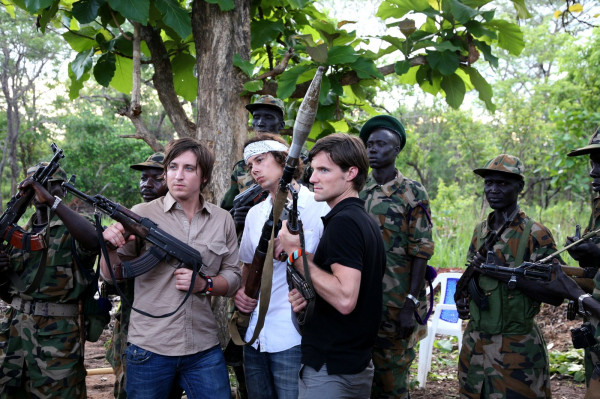If you haven’t been visited Twitter or Facebook recently, you may have missed the news: The Kony 2012 campaign has set the Internet on fire. While in its early stages, it’s fascinating to see how much attention the movement has garnered and to speculate as to where its headed.

The movement is the latest and most public undertaking of Invisible Children, an NGO founded by Jason Russell and Laren Pool with the mission of ending the campaign of violence perpetrated by the Lord’s Resistance Army in Central Africa. Kony 2012 is a social media campaign engineered to draw attention to one man in particular: Joseph Kony, the LRA’s leader. Kony was indicted by the International Criminal Court in 2005 for war crimes, which include the brainwashing of thousands of children into child soldiers, rape, and mutilation.
This is the logic of the campaign. To bring Joseph Kony to trial at the ICC, he must first be captured by the Ugandan military. In order for them to catch a man who has been a guerrilla fighter for more than 20 years, they need military and technical support that was publically first provided by the United States in 2010. For Congress to authorize continued US involvement in Uganda during a time of economic crisis, they must be pressured by the American people… but for the people to pressure Congress they must first know who Joseph Kony is. Despite his notoriety with international justice bodies, the average American has no idea who the leader of the LRA is or what he has done over the past two decades.

Kony 2012 seeks to mobilize public attention by gaining the attention of two groups: “culture makers” and “policy makers.” 20 celebrities, actors, talk-show hosts and athletes were targeted as social media amplifiers, who will theoretically campaign for public awareness of the issue. Pop star Rihanna has already mentioned the campaign on her twitter account. The second targeted group, the policy makers, are a group of 12 current and former officials ranging from Condaleezza Rice to Bill Clinton who will hopefully exercise their influence within Congress for the cause. The movement also calls for a poster/sticker/word of mouth campaign, scheduled to climax on April 20th, when involved activists are instructed to “Cover the Night” and launch a massive poster campaign designed to get the attention of everyone not already clued in by social media.
The source of this energy and enthusiasm? One very well produced internet video.
[youtube http://www.youtube.com/watch?v=Y4MnpzG5Sqc]
The goal of the campaign is to achieve “500,000 shares” within the span of its lifetime, and its producers are well on the way to achieving that goal. At the time of this writing, the video has already achieved more than 3 million views, with the vast majority of those occuring over the past two days. It’s an Internet firestorm, and its sudden surge of popularity has sent the Kony 2012 website reeling off and on.
While the movement is certainly gaining attention and notoriety, it also has its critics. Mark Kersten argues that the Kony 2012 campaign is awash with an “obfuscating, simplified and wildly erroneous narrative” that implicitly places legitimacy with the official Ugandan government. That sort of support is ill-placed, states Kersten, because the Ugandan government is similarly guilty of “collective torture” and “blurring of the perpetrator-victim binary”. From the the perspective of the Kony 2012 detractors, the campaign is a viral oversimplification of an extraordinarily complex conflict, and the simple idea of “making Kony known” is hardly the means to stop a war when both sides are guilty of harming civilians.
Said Laura Seay in one impatient tweet: “My basic premise is that the awareness of American college students is NOT a necessary condition for conflict resolution in Africa.”

Others are critical of Invisible Children’s methods – Samual Gebru, president of the Ethiopian Global Initiative, argues that it is the Ugandans on the ground who should be supported, not an NGO primarily involved with building schools and only minor direct influence on the conflict. Others challenge the idea that even killing Kony will be effective since the atrocities of the war are rooted in the structure of the conflict, rather than a single individual.
Time will tell whether this initial burst of attention – enthusiastic on one end and critical on the other – will translate into action at the congressional level. But in terms of simply focusing the world’s attention on an issue, the campaign should already be considered a success.
In his video, Invisible Children founder Jason Russell makes the argument that the way that social networks and activism have the power to change the way that national policy is created – transferring influence from a limited few with great resources to a like-minded and mobilized collective. If true, it has staggering implications for the way the world works in this new era. We’ll be watching the playing out of this viral activist campaign with great interest.

It is not just American college students that have been mobilized! So are the Chinese students as the video has been forwarded on Weibo many times (the Chinese version of Twitter). But the Chinese discussion doesn’t focus on the bias of the production team on the Ugandan Army. Most Chinese are shocked and disgusted by Kony’s crimes and are quite anxious to save the children…
Though college students can’t go to Uganda, locate Joseph Kony and arrest him, I think the awareness will give pressure to national policies.
I remember how last semester we discussed the LRA and the 100 military advisors US sent to Uganda’s neighbors, and from then on I never heard about it from the media. Now, I’m sure someone will trace their country’s action towards Uganda.